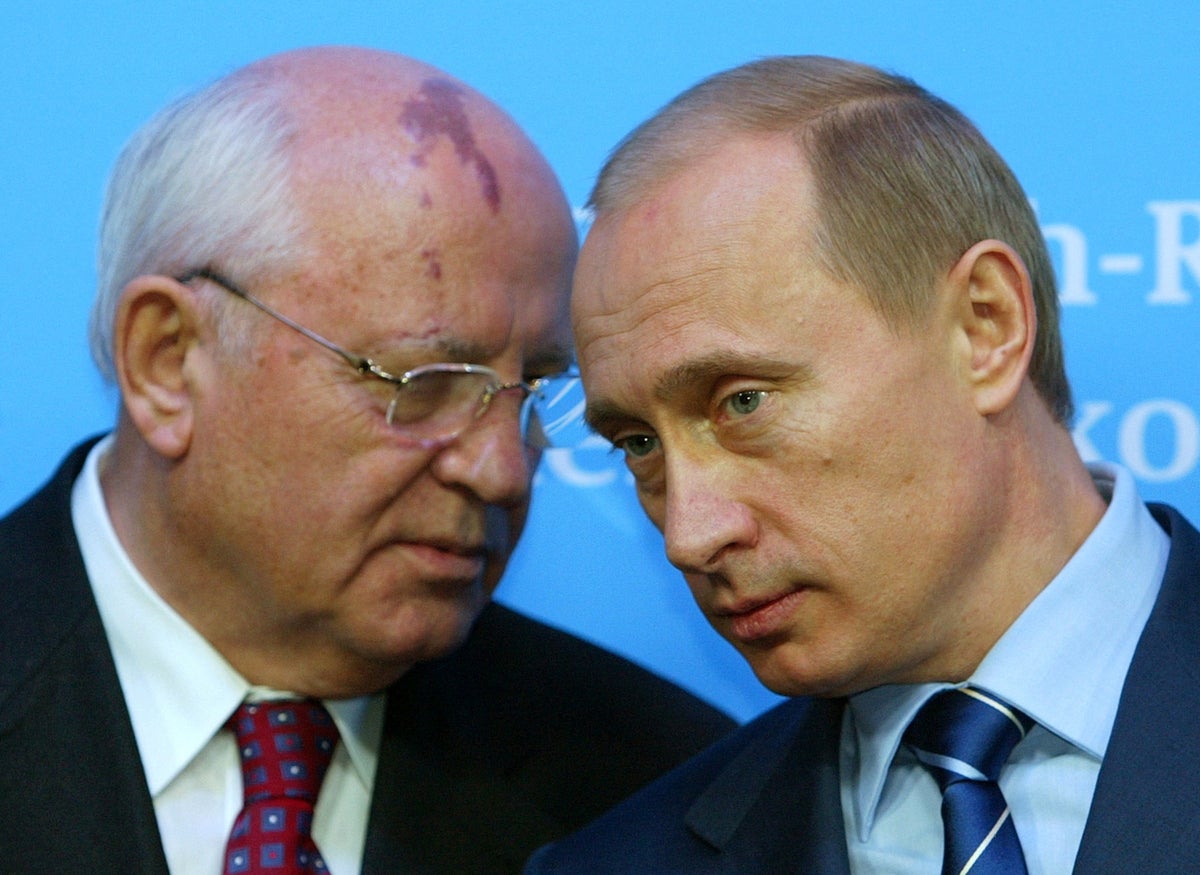
Russian President Vladimir Putin has claimed that Mikhail Gorbachev had a “huge impact on the course of world history”, in a condolence telegram sent on Wednesday.
He added that the last Soviet leader “deeply understood that reforms were necessary” and strove to offer solutions to the problems faced by the Soviet Union in the 1980s.
Mr Gorbachev died in a Moscow hospital on Tuesday, aged 91.
The carefully-worded comments came after Mr Putin expressed his deepest condolences, according to Kremlin spokesman Dmitry Peskov, immediately following the announcement of his death.
The two Russian leaders clashed ideoligically, with one report claiming earlier this year that Mr Gorbachev believed his life’s work has been undone by Mr Putin.
Mr Putin, who has led Russia in some capacity for more than two decades, was serving as a KGB officer in what was then East Germany for much of Mr Gorbachev’s reign.
Though Mr Putin said he did not support the unsuccessful coup to remove Mr Gorbachev from office in 1991, much of his tenure has appeared aimed at reversing many of Mr Gorbachev’s policies.
Mr Putin considered the dissolution of the Soviet Union a humiliation, and has aggressively attempted to expand Russia’s influence and territory in Eastern Europe in recent years — a push that has culminated in the ongoing invasion of neighbouring Ukraine.
In a statement on Wednesday, the Kremlin hailed Mr Gorbachev as an extraordinary global statesman who helped end the Cold War, but said he had been badly wrong about the prospect of rapprochement with the “bloodthirsty” West.
The comments underlined President Vladimir Putin’s feelings about the 1991 collapse of the Soviet Union, which Gorbachev unwittingly presided over, and which Putin has lamented as the greatest geopolitical catastrophe of the 20th century.
Putin, who on Feb. 24 launched what he called Russia’s “special military operation” against Ukraine, one of the 15 former Soviet republics, said beforehand that the demise of the Soviet Union was the “disintegration of historical Russia” and what it had built up over 1,000 years.
While Gorbachev, who died aged 91 in Moscow on Tuesday, is revered by many in the West for helping end the Cold War, many Russians regard him as the man who accidentally destroyed a great country, triggering years of economic hardship, humiliation and a loss of geopolitical clout.
Putin, beyond a bare statement of facts, did not offer any assessment of Gorbachev’s 1985-1991 time in office.
Dmitry Peskov, Putin’s spokesperson, was more blunt.
He described Gorbachev as an extraordinary statesman who had helped end the Cold War but whose role in history was controversial.
“He sincerely wanted to believe that the Cold War would end, and that it would usher in a period of eternal romance between a new Soviet Union and the world, the West,” Peskov said.
“This romanticism turned out to be wrong. There was no romantic period, a 100-year honeymoon did not materialise, and the bloodthirsty nature of our opponents showed itself. It’s good that we realised this in time and understood it.”
Jailed opposition politician Alexei Navalny had warm words for the Soviet Union’s last leader however, noting that he had ordered the release of political prisoners.
“I am sure that his life and history, which were pivotal to the events of the late twentieth century, will be evaluated far more favorably by posterity than by contemporaries,” said a message from Navalny posted on Twitter by his allies.
Nobel laureate Dmitry Muratov, a friend who edits Novaya Gazeta, a newspaper Gorbachev helped fund which has often been critical of the authorities, said the late politician despised war and realpolitik.
“He gave the world and his country an improbable gift: 30 years of peace, without the threat of a global or nuclear war. The gift is over, and there won’t be another one,” wrote Muratov.
Vladimir Ryzhkov, a former member of the Russian parliament and a Kremlin critic, lauded Gorbachev for freeing hundreds of millions of people from tyranny and for drastically reducing the number of nuclear warheads.
He said Gorbachev had given Russia a chance to be free.
“It’s not his fault that we couldn’t use it,” said Ryzhkov.
Mr Gorbachev’s popularity in his native Russia did not nearly equal his popularity in the West.
A 2017 poll found that just 15 per cent of Russians held a favourable opinion of the final Soviet president, who was born into a peasant family of mixed Russian and Ukrainian heritage in the Stavropol Krai region of the Soviet Union.







